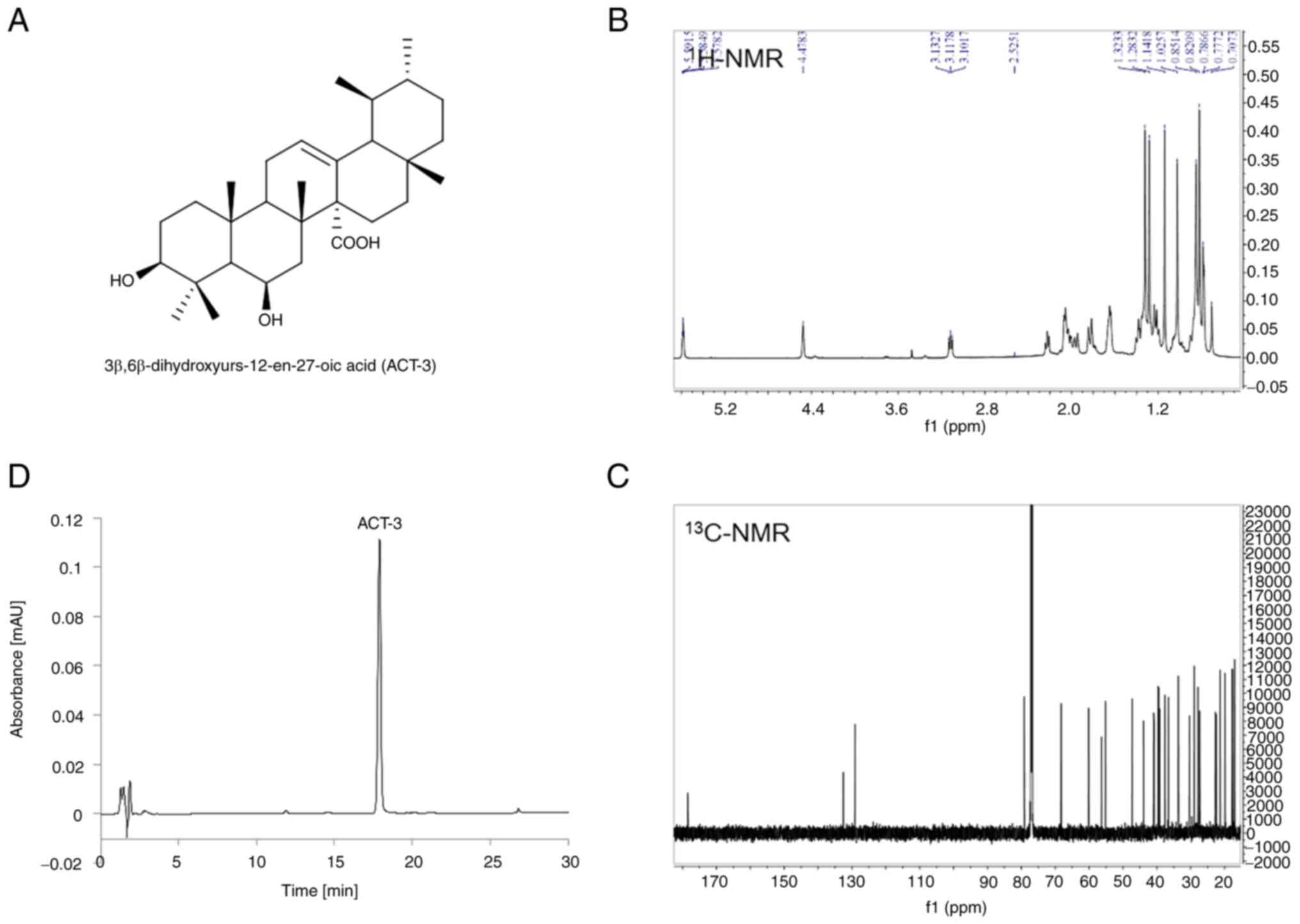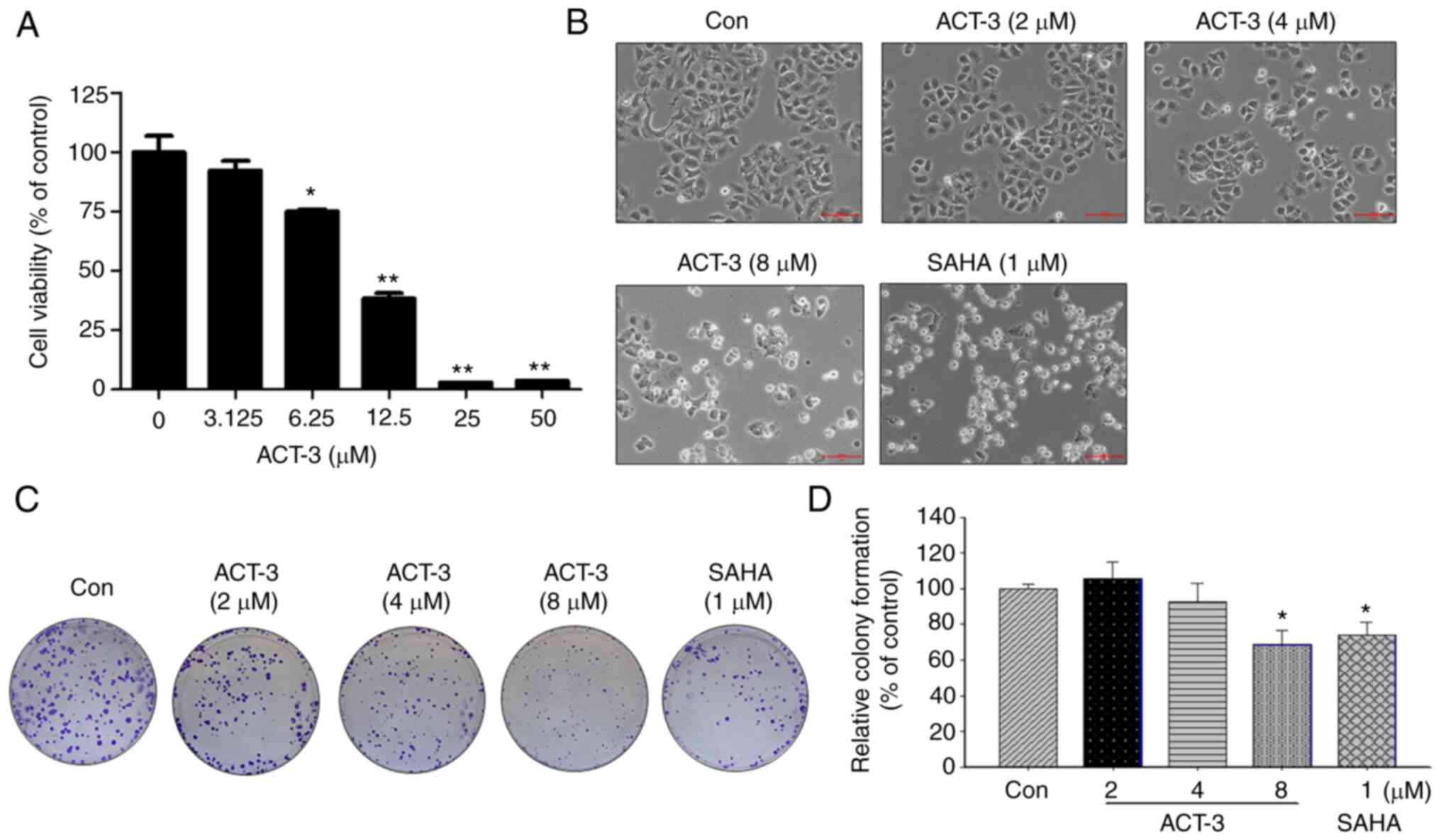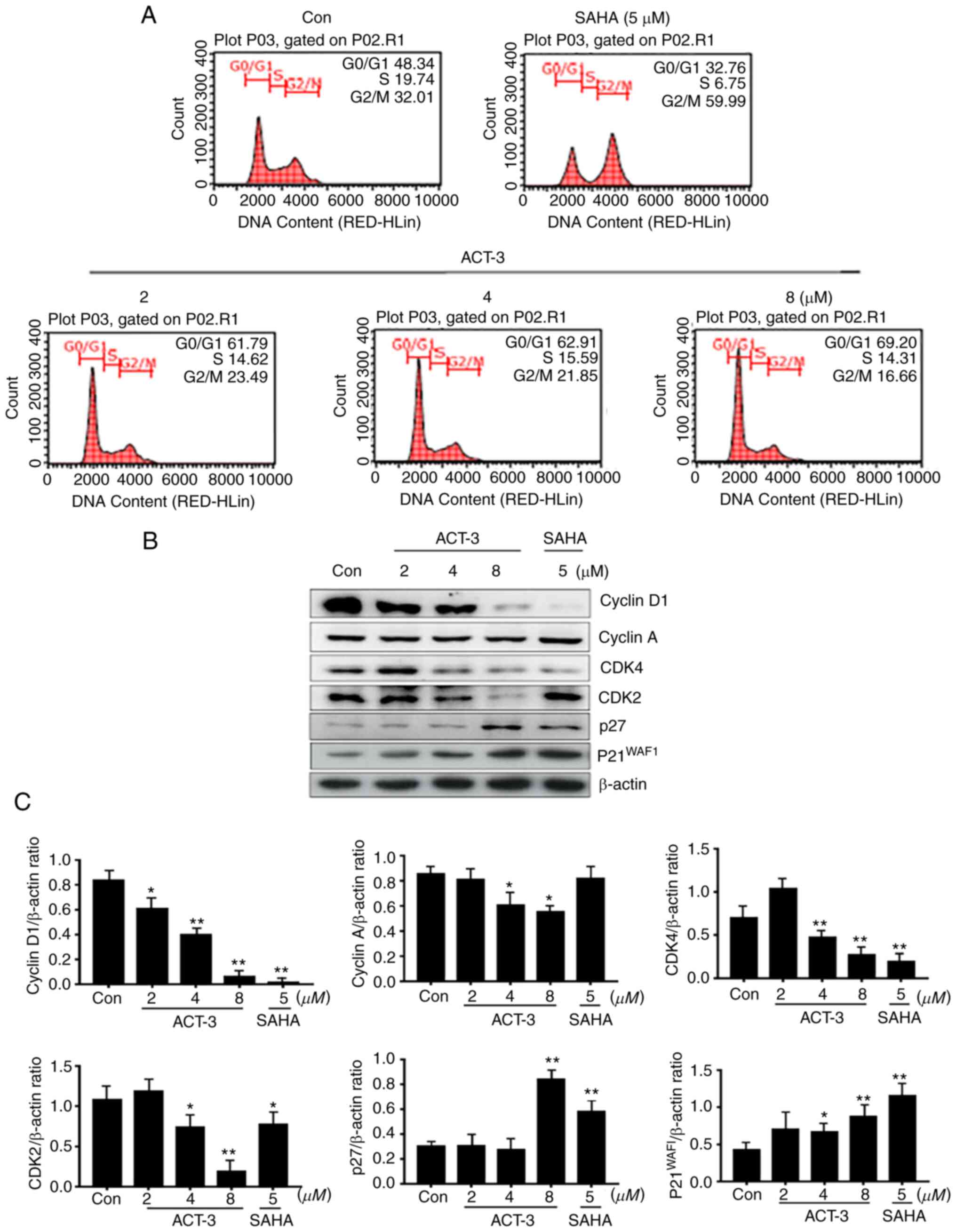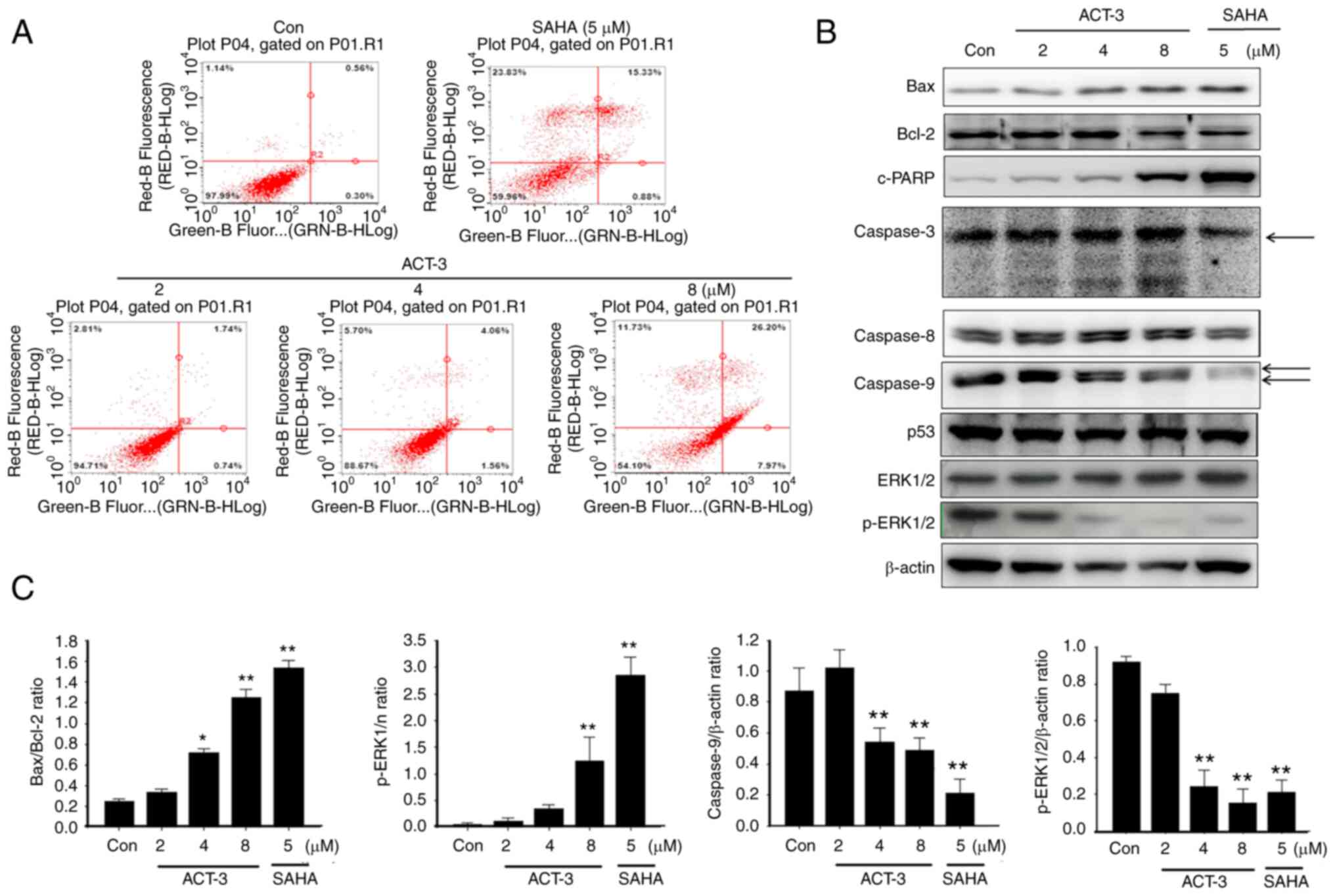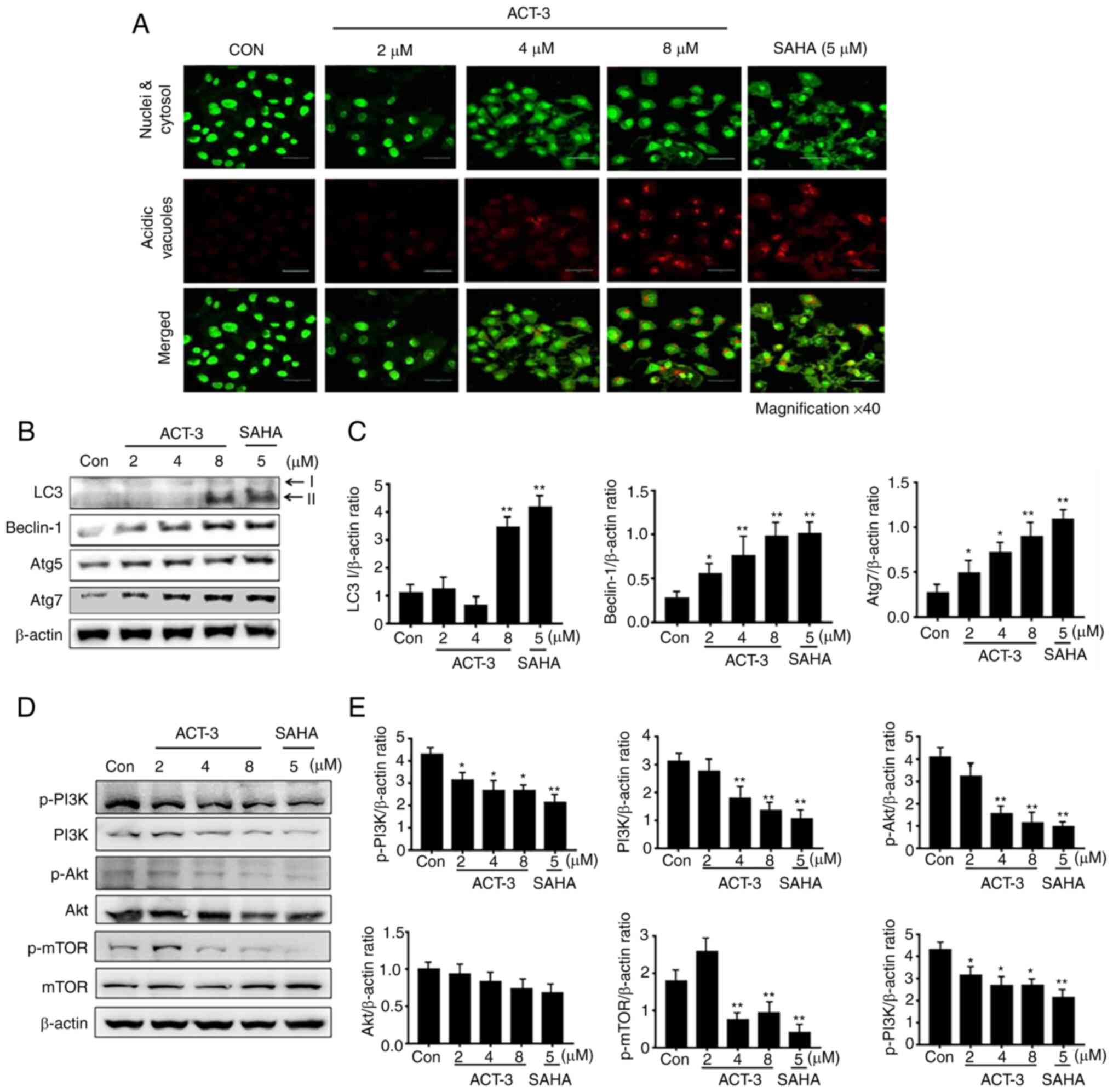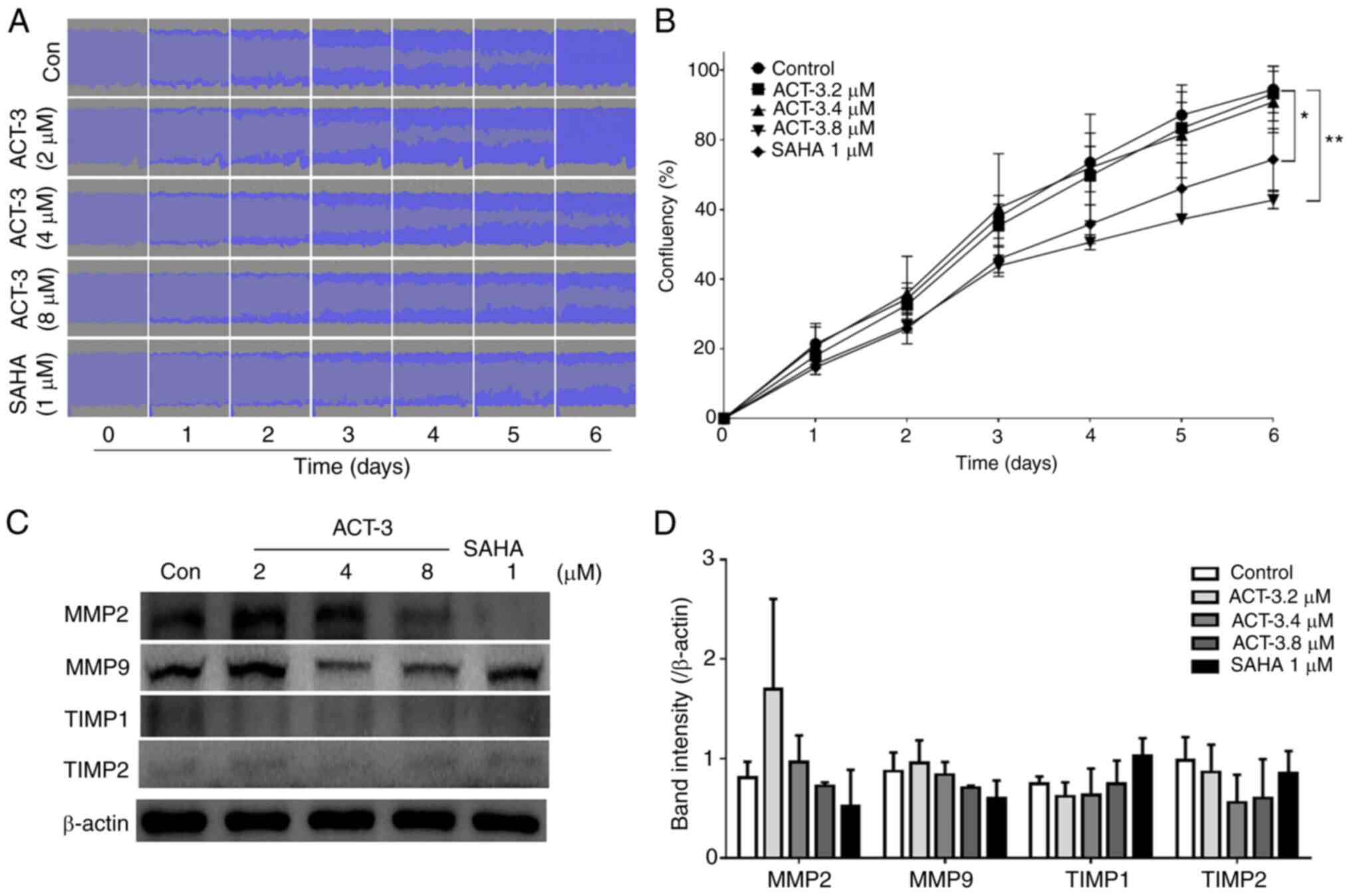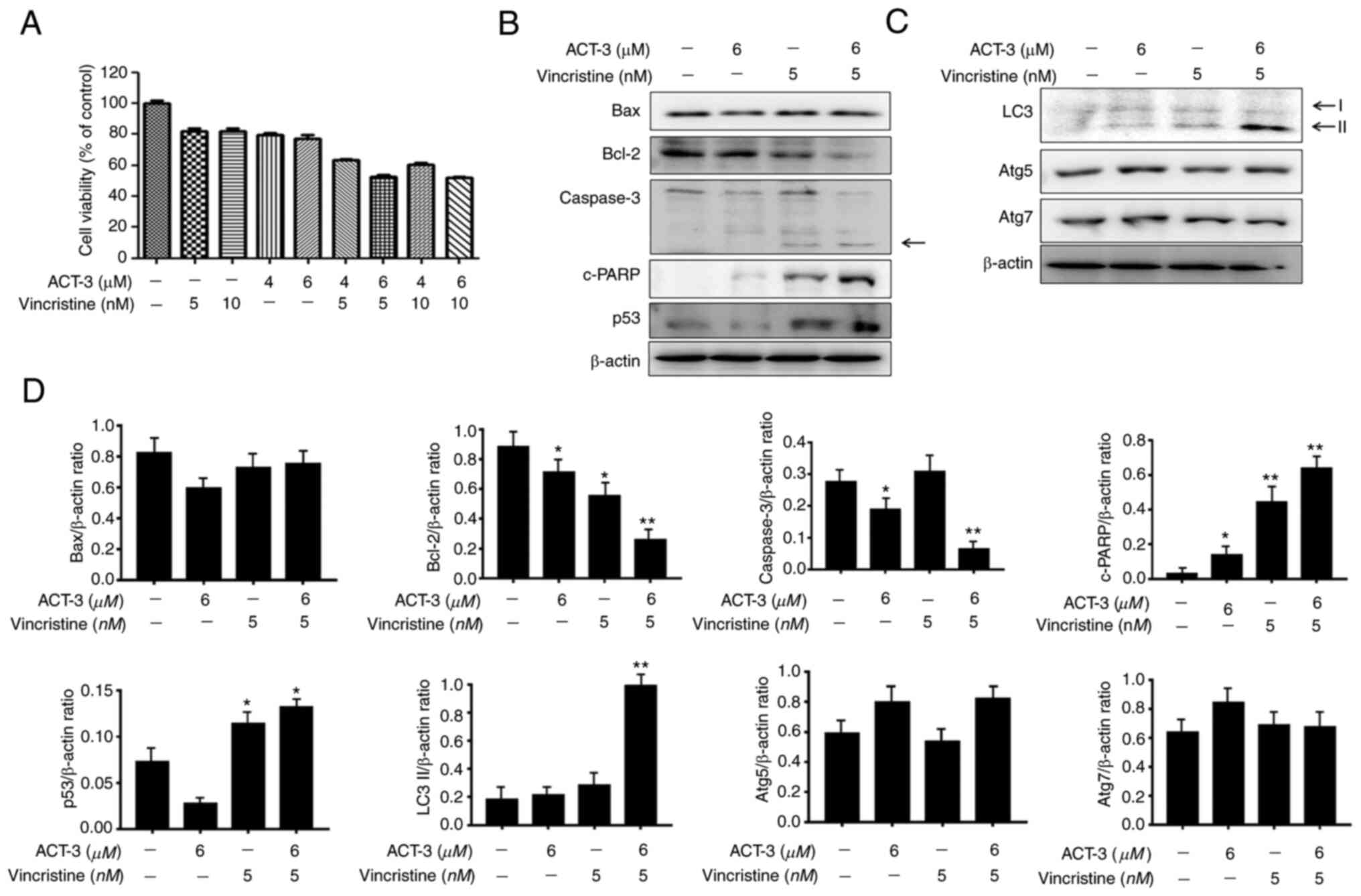|
1
|
Pojani E and Barlocco D: Romidepsin
(FK228), A histone deacetylase inhibitor and its analogues in
cancer chemotherapy. Curr Med Chem. 28:1290–1303. 2021. View Article : Google Scholar : PubMed/NCBI
|
|
2
|
West AC and Johnstone RW: New and emerging
HDAC inhibitors for cancer treatment. J Clin Invest. 124:30–39.
2014. View
Article : Google Scholar : PubMed/NCBI
|
|
3
|
Bass AKA, El-Zoghbi MS, Nageeb EM, Mohamed
MFA, Badr M and Abuo-Rahma GEA: Comprehensive review for anticancer
hybridized multitargeting HDAC inhibitors. Eur J Med Chem.
209:1129042021. View Article : Google Scholar : PubMed/NCBI
|
|
4
|
Sanaei M and Kavoosi F: Histone
deacetylases and histone deacetylase inhibitors: Molecular
mechanisms of action in various cancers. Adv Biomed Res. 8:632019.
View Article : Google Scholar : PubMed/NCBI
|
|
5
|
Ediriweera MK, Tennekoon KH and Samarakoon
SR: Emerging role of histone deacetylase inhibitors as
anti-breast-cancer agents. Drug Discov Today. 24:685–702. 2019.
View Article : Google Scholar : PubMed/NCBI
|
|
6
|
Hanikoglu A, Hanikoglu F and Ozben T:
Natural product inhibitors of histone deacetylases as new
anticancer agents. Curr Protein Pept Sci. 19:333–340. 2018.
View Article : Google Scholar : PubMed/NCBI
|
|
7
|
Wawruszak A, Kalafut J, Okon E, Czapinski
J, Halasa M, Przybyszewska A, Miziak P, Okla K, Rivero-Muller A and
Stepulak A: Histone deacetylase inhibitors and phenotypical
transformation of cancer cells. Cancers (Basel). 11:1482019.
View Article : Google Scholar : PubMed/NCBI
|
|
8
|
Dawood M, Fleischer E, Klinger A,
Bringmann G, Shan L and Efferth T: Inhibition of cell migration and
induction of apoptosis by a novel class II histone deacetylase
inhibitor, MCC2344. Pharmacol Res. 160:1050762020. View Article : Google Scholar : PubMed/NCBI
|
|
9
|
Suraweera A, O'Byrne KJ and Richard DJ:
Combination therapy with histone deacetylase inhibitors (HDACi) for
the treatment of cancer: Achieving the full therapeutic potential
of HDACi. Front Oncol. 8:922018. View Article : Google Scholar : PubMed/NCBI
|
|
10
|
Mottamal M, Zheng S, Huang TL and Wang G:
Histone deacetylase inhibitors in clinical studies as templates for
new anticancer agents. Molecules. 20:3898–3941. 2015. View Article : Google Scholar : PubMed/NCBI
|
|
11
|
Chen R, Zhang M, Zhou Y, Guo W, Yi M,
Zhang Z, Ding Y and Wang Y: The application of histone deacetylases
inhibitors in glioblastoma. J Exp Clin Cancer Res. 39:1382020.
View Article : Google Scholar : PubMed/NCBI
|
|
12
|
Momenimovahed Z and Salehiniya H:
Epidemiological characteristics of and risk factors for breast
cancer in the world. Breast Cancer (Dove Med Press). 11:151–164.
2019.PubMed/NCBI
|
|
13
|
Damaskos C, Garmpis N, Valsami S, Kontos
M, Spartalis E, Kalampokas T, Kalampokas E, Athanasiou A, Moris D,
Daskalopoulou A, et al: Histone deacetylase inhibitors: An
attractive therapeutic strategy against breast cancer. Anticancer
Res. 37:35–46. 2017. View Article : Google Scholar : PubMed/NCBI
|
|
14
|
Naimo GD, Gelsomino L, Catalano S, Mauro L
and Andò S: Interfering role of ERα on adiponectin action in breast
cancer. Front Endocrinol (Lausanne). 11:662020. View Article : Google Scholar : PubMed/NCBI
|
|
15
|
Li J, Zhang T, Yang F, He Y, Dai F, Gao D,
Chen Y, Liu M and Yi Z: Inhibition of breast cancer progression by
a novel histone deacetylase inhibitor, LW479, by down-regulating
EGFR expression. Br J Pharmacol. 172:3817–3830. 2015. View Article : Google Scholar : PubMed/NCBI
|
|
16
|
Newman DJ and Cragg GM: Natural products
as sources of new drugs over the last 25 years. J Nat Prod.
70:461–477. 2007. View Article : Google Scholar : PubMed/NCBI
|
|
17
|
Connolly JD and Hill RA: Triterpenoids.
Nat Prod Rep. 24:465–486. 2007. View
Article : Google Scholar : PubMed/NCBI
|
|
18
|
Dzubak P, Hajduch M, Vydra D, Hustova A,
Kvasnica M, Biedermann D, Markova L, Urban M and Sarek J:
Pharmacological activities of natural triterpenoids and their
therapeutic implications. Nat Prod Rep. 23:394–411. 2006.
View Article : Google Scholar : PubMed/NCBI
|
|
19
|
Na M, Min BS, An RB, Jin W, Kim YH, Song
KS, Seong YH and Bae K: Effect of the rhizomes of Astilbe
chinensis on UVB-induced inflammatory response. Phytother Res.
18:1000–1004. 2004. View
Article : Google Scholar : PubMed/NCBI
|
|
20
|
Sun HX, Ye YP and Pan YJ: Cytotoxic
oleanane triterpenoids from the rhizomes of Astilbe
chinensis (Maxim.) Franch. et Savat. J Ethnopharmacol.
90:261–265. 2004. View Article : Google Scholar : PubMed/NCBI
|
|
21
|
Hu JY, Yao Z, Xu YQ, Takaishi Y and Duan
HQ: Triterpenes from Astilbe chinensis. J Asian Nat Prod
Res. 11:236–242. 2009. View Article : Google Scholar : PubMed/NCBI
|
|
22
|
Tae IH, Son JY, Lee SH, Ahn MY, Yoon K,
Yoon S, Moon HR and Kim HS: A new SIRT1 inhibitor, MHY2245, induces
autophagy and inhibits energy metabolism via PKM2/mTOR pathway in
human ovarian cancer cells. Int J Biol Sci. 16:1901–1916. 2020.
View Article : Google Scholar : PubMed/NCBI
|
|
23
|
Ding J, Liu J, Zhang Z, Guo J, Cheng M,
Wan Y, Wang R, Fang Y, Guan Z, Jin Y and Xie SS: Design, synthesis
and biological evaluation of coumarin-based N-hydroxycinnamamide
derivatives as novel histone deacetylase inhibitors with anticancer
activities. Bioorg Chem. 101:1040232020. View Article : Google Scholar : PubMed/NCBI
|
|
24
|
Li Y and Seto E: HDACs and HDAC inhibitors
in cancer development and therapy. Cold Spring Harb Perspect Med.
6:a0268312016. View Article : Google Scholar : PubMed/NCBI
|
|
25
|
Li Y, Yuan YY, Meeran SM and Tollefsbol
TO: Synergistic epigenetic reactivation of estrogen receptor-α
(ERα) by combined green tea polyphenol and histone deacetylase
inhibitor in ERα-negative breast cancer cells. Mol Cancer.
9:2742010. View Article : Google Scholar : PubMed/NCBI
|
|
26
|
Millot C, Millot JM, Morjani H, Desplaces
A and Manfait M: Characterization of acidic vesicles in
multidrug-resistant and sensitive cancer cells by acridine orange
staining and confocal microspectrofluorometry. J Histochem
Cytochem. 45:1255–1264. 1997. View Article : Google Scholar : PubMed/NCBI
|
|
27
|
Dong C, Wu J, Chen Y, Nie J and Chen C:
Activation of PI3K/AKT/mTOR pathway causes drug resistance in
breast cancer. Front Pharmacol. 12:6286902021. View Article : Google Scholar : PubMed/NCBI
|
|
28
|
Cras A, Darsin-Bettinger D, Balitrand N,
Cassinat B, Soulié A, Toubert ME, Delva L and Chomienne C:
Epigenetic patterns of the retinoic acid receptor beta2 promoter in
retinoic acid-resistant thyroid cancer cells. Oncogene.
26:4018–4024. 2007. View Article : Google Scholar : PubMed/NCBI
|
|
29
|
Godman CA, Joshi R, Tierney BR, Greenspan
E, Rasmussen TP, Wang HW, Shin DG, Rosenberg DW and Giardina C:
HDAC3 impacts multiple oncogenic pathways in colon cancer cells
with effects on Wnt and vitamin D signaling. Cancer Biol Ther.
7:1570–1580. 2008. View Article : Google Scholar : PubMed/NCBI
|
|
30
|
Zhang XH, Wang Z, Kang BG, Hwang SH, Lee
JY, Lim SS and Huang B: Antiobesity effect of Astilbe
chinensis Franch. et Savet. Extract through regulation of
adipogenesis and AMP-activated protein kinase pathways in 3T3-L1
adipocyte and high-fat diet-induced C57BL/6N obese mice. Evid Based
Complement Alternat Med. 2018:13476122018. View Article : Google Scholar : PubMed/NCBI
|
|
31
|
Sancheti S, Sancheti S, Lee SH, Lee JE and
Seo SY: Screening of Korean medicinal plant extracts for
α-glucosidase inhibitory activities. Iran J Pharm Res. 10:261–264.
2011.PubMed/NCBI
|
|
32
|
Gil TY, Jin BR, Hong CH, Park JH and An
HJ: Astilbe chinensis ethanol extract suppresses
inflammation in macrophages via NF-κB pathway. BMC Complement Med
Ther. 20:3022020. View Article : Google Scholar : PubMed/NCBI
|
|
33
|
Zhang YB, Ye YP, Wu XD and Sun HX:
Astilbotriterpenic acid induces growth arrest and apoptosis in HeLa
cells through mitochondria-related pathways and reactive oxygen
species (ROS) production. Chem Biodivers. 6:218–230. 2009.
View Article : Google Scholar : PubMed/NCBI
|
|
34
|
Häcker G: The morphology of apoptosis.
Cell Tissue Res. 301:5–17. 2000. View Article : Google Scholar : PubMed/NCBI
|
|
35
|
Zeiss CJ: The apoptosis-necrosis
continuum: Insights from genetically altered mice. Vet Pathol.
40:481–495. 2003. View Article : Google Scholar : PubMed/NCBI
|
|
36
|
Vermeulen K, Van Bockstaele DR and
Berneman ZN: The cell cycle: A review of regulation, deregulation
and therapeutic targets in cancer. Cell Prolif. 36:131–149. 2003.
View Article : Google Scholar : PubMed/NCBI
|
|
37
|
Nigg EA: Cyclin-dependent protein kinases:
Key regulators of the eukaryotic cell cycle. Bioessays. 17:471–480.
1995. View Article : Google Scholar : PubMed/NCBI
|
|
38
|
Malumbres M and Barbacid M: Cell cycle,
CDKs and cancer: A changing paradigm. Nat Rev Cancer. 9:153–166.
2009. View Article : Google Scholar : PubMed/NCBI
|
|
39
|
Satyanarayana A and Kaldis P: Mammalian
cell-cycle regulation: Several Cdks, numerous cyclins and diverse
compensatory mechanisms. Oncogene. 28:2925–2939. 2009. View Article : Google Scholar : PubMed/NCBI
|
|
40
|
Sauer K and Lehner CF: The role of cyclin
E in the regulation of entry into S phase. Prog Cell Cycle Res.
1:125–139. 1995. View Article : Google Scholar : PubMed/NCBI
|
|
41
|
Peter M: The regulation of
cyclin-dependent kinase inhibitors (CKIs). Prog Cell Cycle Res.
3:99–108. 1997. View Article : Google Scholar : PubMed/NCBI
|
|
42
|
Elmore S: Apoptosis: A review of
programmed cell death. Toxicol Pathol. 35:495–516. 2007. View Article : Google Scholar : PubMed/NCBI
|
|
43
|
Hengartner MO: The biochemistry of
apoptosis. Nature. 407:770–776. 2000. View Article : Google Scholar : PubMed/NCBI
|
|
44
|
Miyashita T, Krajewski S, Krajewska M,
Wang HG, Lin HK, Liebermann DA, Hoffman B and Reed JC: Tumor
suppressor p53 is a regulator of bcl-2 and bax gene expression in
vitro and in vivo. Oncogene. 9:1799–1805. 1994.PubMed/NCBI
|
|
45
|
Vaux DL, Cory S and Adams JM: Bcl-2 gene
promotes haemopoietic cell survival and cooperates with c-myc to
immortalize pre-B cells. Nature. 335:440–442. 1988. View Article : Google Scholar : PubMed/NCBI
|
|
46
|
Pietenpol JA and Stewart ZA: Cell cycle
checkpoint signaling: Cell cycle arrest versus apoptosis.
Toxicology. 181–182. 475–481. 2002.PubMed/NCBI
|
|
47
|
Beneke R, Geisen C, Zevnik B, Bauch T,
Müller WU, Küpper JH and Möröy T: DNA excision repair and DNA
damage-induced apoptosis are linked to Poly(ADP-ribosyl)ation but
have different requirements for p53. Mol Cell Biol. 20:6695–6703.
2000. View Article : Google Scholar : PubMed/NCBI
|
|
48
|
Galluzzi L and Green DR:
Autophagy-independent functions of the autophagy machinery. Cell.
177:1682–1699. 2019. View Article : Google Scholar : PubMed/NCBI
|
|
49
|
Apel A, Herr I, Schwarz H, Rodemann HP and
Mayer A: Blocked autophagy sensitizes resistant carcinoma cells to
radiation therapy. Cancer Res. 68:1485–1494. 2008. View Article : Google Scholar : PubMed/NCBI
|
|
50
|
Döring T, Zeyen L, Bartusch C and Prange
R: Hepatitis B virus subverts the autophagy elongation complex
Atg5-12/16L1 and does not require Atg8/LC3 lipidation for viral
maturation. J Virol. 92:e01513–e01517. 2018. View Article : Google Scholar : PubMed/NCBI
|
|
51
|
Li F, Guo H, Yang Y, Feng M, Liu B, Ren X
and Zhou H: Autophagy modulation in bladder cancer development and
treatment (review). Oncol Rep. 42:1647–1655. 2019.PubMed/NCBI
|
|
52
|
Perez EA: Microtubule inhibitors:
Differentiating tubulin-inhibiting agents based on mechanisms of
action, clinical activity, and resistance. Mol Cancer Ther.
8:2086–2095. 2009. View Article : Google Scholar : PubMed/NCBI
|
|
53
|
Dumontet C and Jordan MA:
Microtubule-binding agents: A dynamic field of cancer therapeutics.
Nat Rev Drug Discov. 9:790–803. 2010. View Article : Google Scholar : PubMed/NCBI
|
|
54
|
Jordan VC: Chemoprevention of breast
cancer with selective oestrogen-receptor modulators. Nat Rev
Cancer. 7:46–53. 2007. View Article : Google Scholar : PubMed/NCBI
|
|
55
|
Younis AM, Wu FS and El Shikh HH:
Antimicrobial activity of extracts of the oyster culinary medicinal
mushroom Pleurotus ostreatus (higher basidiomycetes) and
identification of a new antimicrobial compound. Int J Med
Mushrooms. 17:579–590. 2015. View Article : Google Scholar : PubMed/NCBI
|















